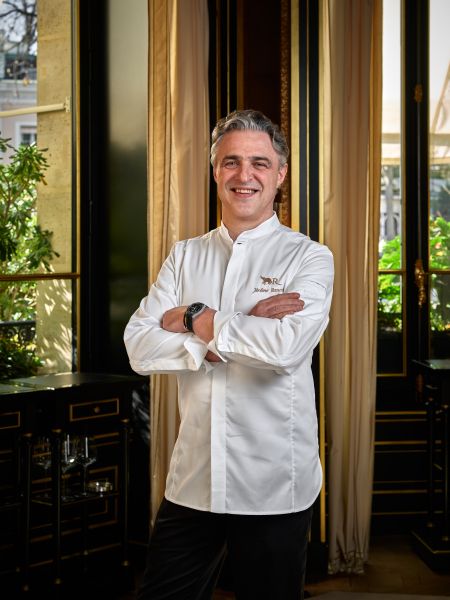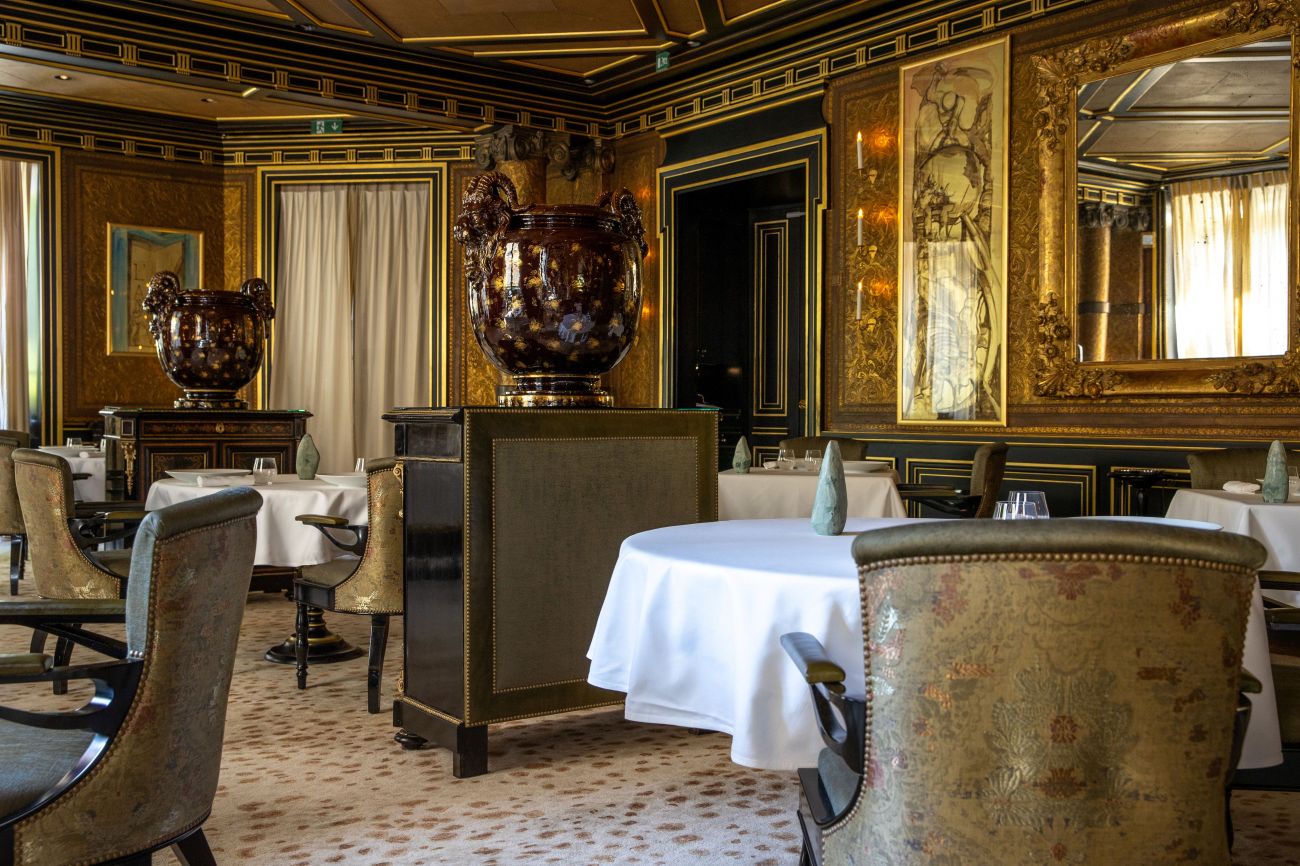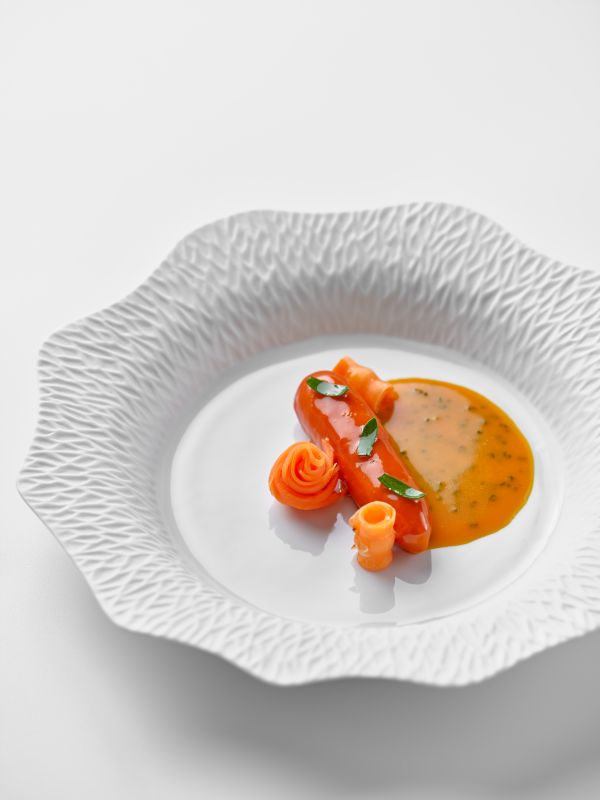
INTERVIEW - JÉRÔME BANCTEL, CHEF AT LE GABRIEL, THE THREE-STAR RESTAURANT IN LA RÉSERVE PARIS: "I LEAVE NOTHING TO CHANCE" (France)
After joining the three-star elite of the culinary world, the chef continues to work hard to deliver a consistently high-quality experience for his guests, and the loyalty of his team is one of the key factors in his success. |
 |
INTERVIEW - JÉRÔME BANCTEL, CHEF AT LE GABRIEL, THE THREE-STAR RESTAURANT IN LA RÉSERVE PARIS: "I LEAVE NOTHING TO CHANCE" (France)
After joining the three-star elite of the culinary world, the chef continues to work hard to deliver a consistently high-quality experience for his guests, and the loyalty of his team is one of the key factors in his success. |
Category: Europe - France - Careers
- Interviews and portraits
- Exclusive experiences
- Gourmet restaurants
- Rewards - Gourmet restaurants - Career - Interviews
Interview made by Vanessa Guerrier-Buisine on 2024-05-15
 Chef Jérôme Banctel has just been awarded his third Michelin star for the restaurant Le Gabriel in La Réserve Paris
Photo credit © Julie Limont / La Réserve Paris
In this realm of precision, Chef Banctel is supported daily by a solid team that he has managed to build up since the opening of La Réserve Paris, the palace where he officiates. A team whose merits he praises, to the point of sharing his three-macaron jacket with his second-in-command, Linh Nguyen, with whom he collaborates on all his creations.
At Le Gabriel, for which he won the Grail, it is the whitewashed cuisine that is the rule, and which attracts guests. This success was facilitated and encouraged by the owner of the eponymous group, Michel Reybier Hospitality, to which the palace belongs. Michel Reybier, the chef's unfailing supporter, has enabled him to roll out a wholly new organization, thanks to a forced closure during the Covid pandemic.
A few weeks after adding a star to the two already acquired in 2015, chef Jérôme Banctel gave an interview to Journal des Palaces.Journal des Palaces: You have just been awarded three stars in the Michelin Guide 2024. In your opinion, what do all the three-star chefs have in common? Do you share the same vision of excellence?Jérôme Banctel: It's the Michelin Guide that determines these common points, but I think the first of them all is the quest for excellence. The culinary signature is also the most important thing for me.When did you find your culinary signature, lime cuisine?I found it right out of Covid-19. I spent 20 years working behind chefs, including ten years with Alain Senderens and ten years with Bernard Pacaud, which means working for 20 years with the identity of the person you're working with. Six months after the opening of Le Gabriel in 2015, the restaurant was awarded two stars, with an identity that was a mix between Pacaud, Banctel and Senderens.
Since 2015, I had been working 'full steam ahead', trying to change everything to find my signature. Then Covid-19 came along and forced us to close the gastronomic restaurant for almost three years. Above all, it was an opportunity to reflect and put my personality on the table. That was the start of the big revival.What organizational changes were made to take the restaurant from two to three stars?In the restaurant, when Covid-19 left, we reduced the number of tables from 15 to eight and decided to close on Saturdays and Sundays, when we were open 7 days a week. We also laid down a carpet to soften the noise.
Above all, we took possession of the table. In a very Parisian setting, signed Garcia, we brought back my native Brittany, by placing a menhir on the table or through the choice of colours for the plates.
We've also introduced some changes to the menu, offering two menus, whereas we used to work exclusively à la carte, and creating a menu inspired by Brittany and my travels.And what about your team?The dining room relies on a real sommelier team, with a talented young head sommelier, Gaëtan Lacoste, who is present for every service, and a dining room manager, Alexandre Augé. He understands my message and is very good at explaining my cuisine and my inspirations…
And in the kitchen, Linh has worked alongside me for 15 years on the creative side. She and I are devoted to creation, from morning to night, which is invaluable because not many places allow you to do that.
Finally, for the last three or four years, the whole team has been stable, both in the kitchen and in the dining room. A team that takes pleasure in cooking for excellence, with a service of 16 to 24 covers.Does it make a difference when you're the chef of an individual restaurant to achieve your goal of a third star?It all depends on the restaurant's policy. It's important to have someone at the head of the hotel who thinks like you and gives you the material and human resources. This allows us to make more direct decisions, to get things up and running quickly.Do La Réserve Paris and its management help you to go further?On a personal level, I'd say it's an accelerator because I gained a few years when I left Covid-19 by having the support of Michel Reybier.As well as the recognition and pride you feel, is the award of this third star a source of pressure?I think it's a liberation for the teams and myself, not pressure. Liberation, because I've been in the running for three stars for several years now. I've been waiting for these three stars because, for me, it meant winning the recognition of my peers.
I still haven't achieved it, even though I'm wearing the three-star jacket. We're not going to change the way we work, but we're going to keep moving forward, creating and changing, so that Linh and I can fulfil our potential and bring something back to our staff.Are you planning to recruit soon, and on what criteria do you recruit?I'll be recruiting in September in meat cooking. I'm looking for someone who's quite strong, who already has good references in the big houses, but not in a classic style of cooking, more in a liberated style.How do you retain your staff, and what have you put in place to achieve this?We do everything possible to keep our staff. Having Saturdays and Sundays off in Paris, having two weeks off in February and three weeks in August, and having all public holidays means we can return to a normal way of life.
We have 16 covers, we don't do volume, and even though the pressure is on, everyone knows what they have to do. On average, I rotate the shifts every six months so that the team doesn't get bored and maintains a certain amount of pressure. When you take on a job you don't know very well, that keeps the pressure on.
There's very good communication, and a great understanding between the dining room and the kitchen. Twice a year, we have a meal with the staff, including the whole dining room, the kitchen, and the pastry shop.
That's what I wanted to start when we left Covid-19 because before we were in a palace, but the mentality was different. We've really strengthened our ties since then. In fact, we all went out to celebrate the third star in a nightclub until 5 in the morning.
Every Friday, I do a 2.5-minute written quiz for the entire team, with questions about the house, the group, Escoffier, Michelin… and they win prizes. Now, I'm giving them the chance to win the seven signed two-star jackets.
It's not at all like it was for my generation, nowadays, you can say things without shouting.What kind of relationship do you have with your restaurant staff so that they are immersed in your creations?The links between the dining room and the kitchen are very important. I'm involved in the recruitment of all the key positions because it also has to fit in with my identity. We prepare the plate in the kitchen, but if it's badly explained, badly served, with no interest in the work of the kitchen, the experience isn't the same. In the same way, if Gaëtan doesn't know how to recommend the right wine and food pairing or Alexandre doesn't welcome the guest properly, we lose all the benefit of the plate.
To make it easier for the teams to discuss our dishes, we have them all tasted. Gaëtan prepares his pairings and lets me taste them - it's a real team effort. I communicate on WhatsApp every time we change a dish. We also have two briefings a day, before each service, with a representative from the kitchen and the pâtisserie.
The room plays a role even before the guests arrive, to prepare the experience, to know the occasion for which the guests are coming, their preferences and intolerances, etc. In the restaurant, the team carries out an entire ceremony, explaining the menus, the products, and their origins. I also sometimes go into the dining room to serve the mackerel and so on.What is the creative process like?Linh focuses on the creation, then we taste together and come to an agreement. She then moves on to the position affected by the change, and it's she who explains, shows, re-explains and provides feedback to the teams.
I have a very technical, square kitchen, where everything is weighed up. I used my instincts to get two stars, but to get three stars, there's no room for guesswork. To ensure consistency, each dish has been tasted beforehand, seasoned with precision, and weighed. I leave nothing to chance, everything is calculated.
Today, my cooking revolves around quicklime for everything vegetable. Then I work on all my sauces without butter or cream. So, I have to find a solution to make them tasty by working with oils, tapioca flour to bind, reduced stocks, vegetable juices and fruit juices. Weighing everything up, our sauces are the same every day. Even poultry juices are prepared differently. The pâtisserie, run by Jordan Talbot, works in the same spirit, always in liaison with Linh, so that we have the same signature, from starter to dessert.What would you like to pass on to the younger generation?Now that I have my own signature, young people want to learn it. I've just taken on an Austrian who was in Belgium and absolutely wanted to come and work here. Young people intend to imbibe a style and then do something else for themselves.
It's important for me to leave my mark on French cuisine. In fact, this year I'm going to produce a book on cooking with lime and butter-free sauces.What advice would you give to a young person who dreams of one day winning a star?You have to work hard and surround yourself with the right people. That's what I've done, surrounding myself with Linh on the creative side and Florian (editor’s note: Florian Gravelle, executive sous-chef) on the operational side. You have to articulate the roles of each person, give meaning, make corrections, suggest new ideas… and find compromises.
 The chef has also left his Breton mark on the Gabriel dining room.
Photo credit © Grégoire Gardette / La Réserve Paris
 La carotte, Jérôme Banctel, at the Gabriel, La Réserve Paris
Photo credit © Julie Limont / La Réserve Paris
|
|






